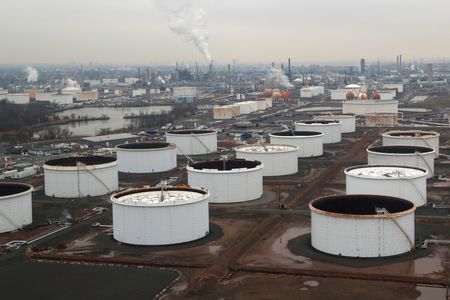By Shariq Khan
NEW YORK (Reuters) -Oil prices settled on Thursday near their lowest level in seven-weeks, narrowly mixed and under pressure from weaker global demand, rising inventories and fading hopes for a quick cut in U.S. interest rates.
U.S. West Texas Intermediate crude futures fell 5 cents to settle at $78.95 a barrel, the lowest since March 12. Global benchmark Brent crude futures also hit the lowest since early March, then bounced off session lows to settle 23 cents, or 0.3%, higher at $83.67 a barrel.
Both benchmarks closed below their 200-day moving average, which is the key technical indicator of a bear market shift in crude oil prices, StoneX oil analyst Alex Hodes said.
Oil investors have grown worried about a possible economic slowdown in the U.S., as the war between Israel and Hamas continues without any major hit to Middle Eastern oil supplies.
On Wednesday, oil prices fell more than 3% after the U.S. government reported a surprise jump in crude oil stocks and the Fed left interest rates unchanged citing stubborn inflation.
“Now it’s all a story of demand as risk premium from tensions in the Middle East seen last month morphs into residual risk,” said Gaurav Sharma, an independent oil analyst in London.
A slump in worldwide diesel demand is also feeding concerns about slowing oil demand growth in big economies. Gasoil stocks, which include diesel, rose by more than 3% in Europe’s Amsterdam-Rotterdam-Antwerp refining and storage hub during the week to Thursday, data from consultancy Insights Global showed.
Diesel demand in the U.S. Gulf Coast refining hub, also called PADD 3, is estimated to be below the prior three-year range, Hodes said. “The bearish kicker is that even with these inventory builds, production of distillates in PADD 3 is at its lowest level since the start of March,” he added.
U.S. ultra-low sulfur diesel futures fell to their lowest since July 2023 for the third session on the trot.
Supporting prices, the Organization of Petroleum Exporting Countries and allies (OPEC+) could extend output cuts if demand fails to pick up, three sources from the group told Reuters.
Traders were watching whether lower oil prices will spur the U.S. government to replenish strategic reserves.
“The oil market was supported by speculation that if WTI falls below $79, the U.S. will move to build up its strategic reserves,” said Hiroyuki Kikukawa, president of NS Trading.
(Reporting by Robert Harvey in London, Deep Vakil in Bengaluru, Mohi Narayan in New Delhi and Yuka Obayashi in Tokyo; Editing by David Goodman, Jan Harvey and David Gregorio)
